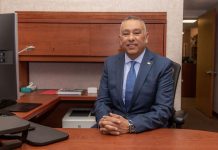San Diego County Board of Supervisors Chair Nathan Fletcher started and ended his March 29 State Of the County speech with the same directive: county residents must work collaboratively.
Homelessness took top position in the address– Fletcher said county government has pushed back against homelessness in the past three years with Mobile Crisis Response Teams designed to streamline behavioral health outreach to unsheltered residents.
“We’re going to be opening up new crisis stabilization locations all over the county,” Fletcher said, and plan to staff facilities with individuals who have faced addiction in their own lives, “taking those who’ve walked the long road of addiction recovery” and putting them to work.
The county is utilizing a grant from the Lucky Duck Foundation, Fletcher said, to build a 150-bed shelter in the Midway District. Plans are also being developed for county-municipality partnerships in which cities provide a building and the county supplies staff to run localized homeless outreach centers, funded with $10 million in available grants.
Fletcher briefly touched on the pandemic, said San Diego county and the state of California “saved lives” through their choices.
“We had half the death toll of Florida,” Fletcher said, but families are now facing the challenge of economic recovery.
Wages, Fletcher said, have not kept up with prices. He would like to see the state budget surplus “provide for people in need” but did not specify exactly how he would like to see those dollars routed to best benefit constituents.
He would like the county to develop apprenticeship opportunities on county land, reverse any ban on private-government partnerships, and build union jobs that would ostensibly lead to better planned retirements in later life.
“I’ve never met a senior with a pension who is living on the street,” Fletcher said, alluding to post-retirement benefits of working at a unionized job.
Funding childcare would also help families recover economically, he said and move the needle in favor of middle class parents. Currently, he said, preschool is more expensive than a home mortgage and lack of affordable childcare is a workforce barrier for women.
The county is working to identify unused properties that can be converted to small facilities and next month, $10 million will be considered as a means to fund childcare.
The foster system also needs attention, he said, with siblings, children over the age of eight and especially teens most in need.
“We need our faith-based groups to step up,” Fletcher said to applause, then added a request for everyone applauding to step up as well and consider fostering a child.
Last year, he said, the county saw an increase in opioid-related overdoses, a trend that has held true for a decade. A lawsuit against Purdue Pharma is in the end stages, he said, with a settlement on the horizon.
Fletcher wrapped up his address by addressing climate change and outdoor experiences, and said a request that dates back to former District 2 representative Dianne Jacob- a larger helicopter to fight wildfires- is likely to be funded by the county.
Additionally, the county is establishing a program for some residents to access county parks for free and utilize free camping equipment.
Fletcher closed his speech by thanking veterans and their families, said the county has a goal to double the number of veterans in their workforce.
“It falls on all of us to challenge our most vexing problems,” Fletcher said, reiterating his opening statement: collaboration is key.















